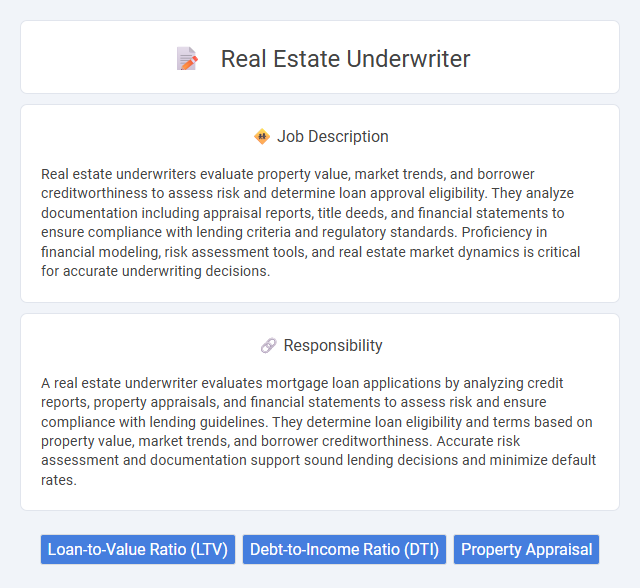
Real estate underwriters evaluate property value, market trends, and borrower creditworthiness to assess risk and determine loan approval eligibility. They analyze documentation including appraisal reports, title deeds, and financial statements to ensure compliance with lending criteria and regulatory standards. Proficiency in financial modeling, risk assessment tools, and real estate market dynamics is critical for accurate underwriting decisions.
Real estate underwriters are likely to be suitable if they possess strong analytical skills, attention to detail, and comfort with financial data and risk assessment. Individuals who tend to be cautious, methodical, and capable of making objective decisions under pressure may find this role aligns well with their strengths. Those who prefer dynamic interpersonal interactions or creative tasks might find the job less fulfilling or suitable.
Qualification
A real estate underwriter requires a strong background in finance, economics, or real estate, often holding a bachelor's degree in one of these fields. Proficiency in risk assessment, credit analysis, and familiarity with property valuation and market trends are essential qualifications. Certifications such as Certified Mortgage Underwriter (CMU) or Licensed Real Estate Agent can enhance credibility and career advancement opportunities.
Responsibility
A real estate underwriter evaluates mortgage loan applications by analyzing credit reports, property appraisals, and financial statements to assess risk and ensure compliance with lending guidelines. They determine loan eligibility and terms based on property value, market trends, and borrower creditworthiness. Accurate risk assessment and documentation support sound lending decisions and minimize default rates.
Benefit
Real estate underwriters are likely to benefit from a stable career path with opportunities for professional growth due to the consistent demand for property financing. The role may offer financial incentives such as competitive salaries and bonuses tied to successful loan approvals. Access to industry insights and networking opportunities within the real estate and finance sectors might further enhance career advancement prospects.
Challenge
Real estate underwriter jobs likely involve significant challenges in accurately assessing property values and risks due to fluctuating market conditions and incomplete information. They probably must balance thorough financial analysis with regulatory compliance while managing tight deadlines. The role may demand strong decision-making skills under uncertainty to minimize lending risks effectively.
Career Advancement
Real estate underwriters analyze property values, market trends, and borrower credit to assess loan risks, playing a crucial role in securing mortgage approvals. Career advancement opportunities include progressing to senior underwriter, underwriting manager, or risk assessment director, often requiring enhanced analytical skills and industry certifications such as Certified Mortgage Underwriter (CMU). Expertise in real estate finance, regulatory compliance, and decision-making accuracy significantly boosts prospects for leadership roles within financial institutions or real estate firms.
Key Terms
Loan-to-Value Ratio (LTV)
A real estate underwriter evaluates property values and borrower creditworthiness to assess the Loan-to-Value Ratio (LTV), which is crucial for determining loan risk. The LTV ratio, calculated by dividing the loan amount by the appraised property value, directly influences loan approval and interest rates. Accurate LTV analysis helps minimize default risk and ensures compliance with lending guidelines.
Debt-to-Income Ratio (DTI)
Real estate underwriters critically evaluate loan applications by analyzing the Debt-to-Income Ratio (DTI) to determine borrower creditworthiness. A lower DTI ratio, typically below 43%, signals a borrower's ability to manage monthly debt obligations relative to income, reducing default risk. Accurate DTI assessment ensures lenders approve loans aligned with financial guidelines, safeguarding investment portfolios.
Property Appraisal
Real estate underwriters assess property appraisals to determine accurate market value and verify compliance with lending guidelines. They analyze appraisal reports that include comparable sales, property conditions, and neighborhood trends to mitigate financial risk for lenders. Expertise in interpreting appraisals ensures reliable loan decisions and supports underwriting integrity.
 kuljobs.com
kuljobs.com